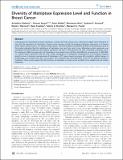Diversity of matriptase expression level and function in breast cancer
Abstract
Overexpression of matriptase has been reported in a variety of human cancers and is sufficient to trigger tumor formation in mice, but the importance of matriptase in breast cancer remains unclear. We analysed matriptase expression in 16 human breast cancer cell lines and in 107 primary breast tumors. The data revealed considerable diversity in the expression level of this protein indicating that the significance of matriptase may vary from case to case. Matriptase protein expression was correlated with HER2 expression and highest expression was seen in HER2-positive cell lines, indicating a potential role in this subgroup. Stable overexpression of matriptase in two breast cancer cell lines had different consequences. In MDA-MB-231 human breast carcinoma cells the only noted consequence of matriptase overexpression was modestly impaired growth in vivo. In contrast, overexpression of matriptase in 4T1 mouse breast carcinoma cells resulted in visible changes in morphology, actin staining and cell to cell contacts. This correlated with downregulation of the cell-cell adhesion molecule E-cadherin. These results suggest that the functions of matriptase in breast cancer are likely to be variable and cell context dependent.
Citation
Welman , A , Sproul , D , Mullen , P , Muir , M , Kinnaird , A R , Harrison , D J , Faratian , D , Brunton , V G & Frame , M C 2012 , ' Diversity of matriptase expression level and function in breast cancer ' , PLoS One , vol. 7 , no. 4 , e34182 . https://doi.org/10.1371/journal.pone.0034182
Publication
PLoS One
Status
Peer reviewed
ISSN
1932-6203Type
Journal article
Description
This work was funded by Cancer Research UK Program Grant (C157/A9148).Collections
Items in the St Andrews Research Repository are protected by copyright, with all rights reserved, unless otherwise indicated.

